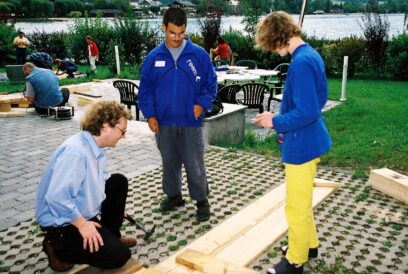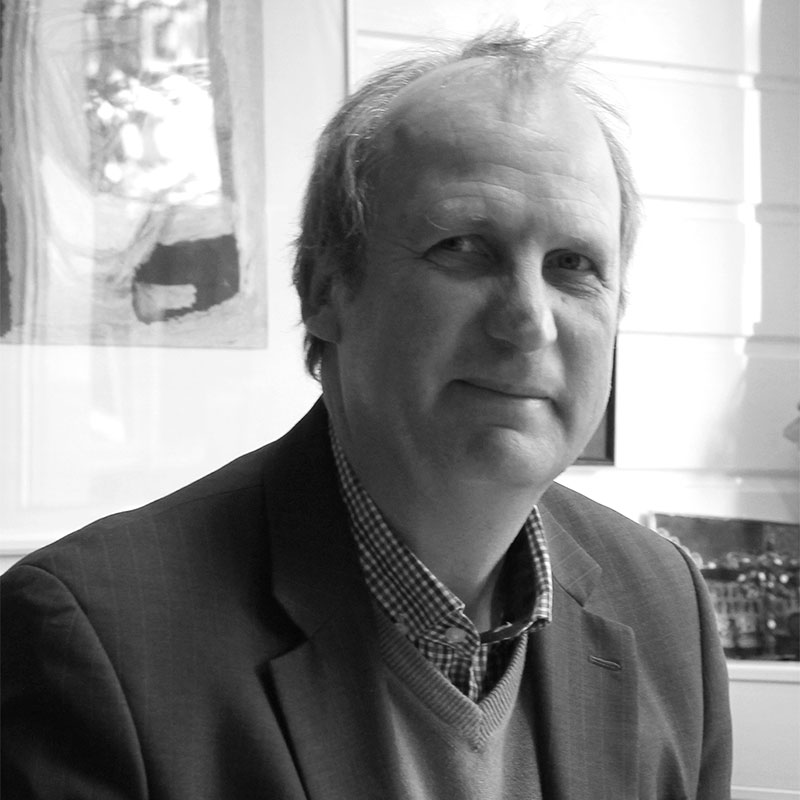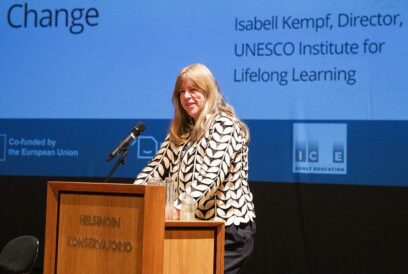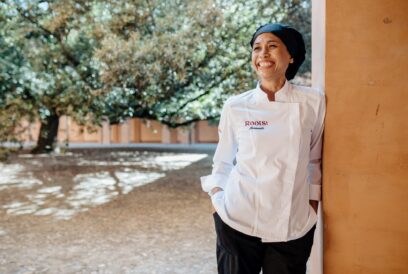What is the best way to involve adult education staff in the process of sustainable development? The ESD Alliances project of the German DVV International brings together European organisations that implement ‘Education for Sustainable Development‘ in their own institution. Three voices from the project show how this can be done on the ground.
Dr Stefan Hebenstreit, Director, and Bettina Krauß, Head of Section Politics, Society, Environment & Volunteering, Kreisvolkshochschule (KVHS) Groß-Gerau
There are almost 50 employees and around 300 freelance course instructors at KVHS Groß-Gerau. Above all, lecturers are the key players, as they can directly implement the topic of ‘Education for Sustainable Development‘ (ESD) in their courses, but they also have to inspire the participants.

“Lecturers are the key players, but they also must be able to inspire learners”, says Bettina Krauss.
However, our approach to sustainable organisational development in the sense of the whole-institution approach begins earlier, namely by recruiting new and younger course instructors.
This became necessary because of the consequences of the COVID-19 pandemic, which was a turning point in the entire further education sector, including the adult education job market. That’s why we also need new experts who want to teach courses at Volkshochschule in order to be able to offer new topics and formats.

“As it became clear that the future of our institute depends on sustainable action, our employees became motivated to participate in the project”, says Stefan Hebenstreit.
In this respect, our understanding of sustainability includes a historical definition from forestry: a forester is only allowed to cut down as many trees as can regrow. Conversely, he/she also has to plant as many seedlings, as trees will be needed for wood in the future.
Because it became clear to them that the future viability of our education institute depends on sustainable action, our employees were motivated to participate in the project.
During the lifecycle of ‘International ESD Alliances‘, we developed ideas on how we can recruit new course instructors and how we can get the old and new lecturers better involved in the necessary transformation process over the next few years.
This participation, in the shape of more frequent pedagogical conferences, inhouse training sessions, online surveys and community events in our region, is also the key for the further establishment of ESD in our organisation and our educational programme.
Prof. Dr Heike Molitor, University for Sustainable Development Eberswalde, Department of Environmental Education & Education for Sustainable Development
There are good arguments that convince staff in adult education institutions to participate in the process:
Argument 1: The concept of sustainable development now affects everyone and is no longer a marginal topic for specialists. It is a task for society as a whole that applies to all people equally.
With the 17 UN Sustainable Development Goals (SDGs), a canon of goals has been developed that addresses various issues. This is where the adaptability of the Adult Education Centres in particular becomes apparent, because hardly any other adult education institution in Germany has such a rich and broad range of topics that can be linked to these 17 goals.
Argument 2: Methodologically and didactically, adult education and the concept of Education for Sustainable Development are comparable. Both are based on an interactive and participatory approach according to people’s lifeworld. Therefore, there is no need for a different pedagogical approach, but rather a slightly different perspective on content.
Argument 3: To integrate ESD, it is important that all voices in the organisation are heard. Changes need to be developed and implemented in a participatory way, making it a collaborative task requiring the expertise of all.
Based on these arguments, a process of change can start in which the whole organisation can be changed. This is not just about content, but also about areas of work such as sustainable procurement, sustainable teaching/learning environments or establishing new collaboration that helps to implement sustainability.
In my role as a coach, it is important for me that the adult education institution finds its own way towards sustainability and formulates its own goals. I accompany people and support them in the transformation process.”
Eva Heinen, Team ESD Alliances, DVV International
Holistic organisational development that aims to establish sustainable and future-proof structures can only succeed in consultation with the organisation’s own staff. Commitment from management level and willingness to change towards transparent and participatory processes therefore form the first important step on the path of a whole-institution approach (WIA).

“Learners as the most important source of ideas should not be forgotten in the process,” reminds Eva Heinen.
A first step towards the start of such communication can be taken, for example, through participation formats. In our project, our partner organisations chose different approaches.
In some organisations, (digital) surveys were launched under the motto “Your Voice Counts” to ask the staff what was most urgent for them in terms of sustainability in their own organisation. Other partners have used “team days” to gauge the initial mood and collect ideas for concrete implementation through interactive methods.
These formats have proven to be an important medium to initiate communication with their own staff and to put the topic of “living sustainability” on the agenda of all employees. Through regular updates by the core working group, a continuous discourse on the topic of sustainable organisation could be established with many partners.
In addition to the staff, the other actors who keep our educational organisations running should not be forgotten. First and foremost, these are the course instructors or facilitators of educational events. They should also sit at the table or be invited as advisors to working groups.
And last but not least, we would like to appeal to ALE institutions not to forget their learners as the most important source of ideas, because if we really want to live what we teach (“Teach, what we learn”), then their ideas and feedback are our decisive axis for action.
ESD Alliances project
DVV International is the Institute for International Cooperation of the Deutscher Volkshochschul-Verband e.V. (DVV), the German Adult Education Association. It supports the implementation of ESD in terms of the “whole-institution approach” through a cross-border initiative International ESD Alliances.
Twelve selected ALE (Adult Learning and Education) institutions are implementing ESD activities into their organisational structures by adapting a holistic understanding of sustainability and focusing on environmental as well as social and economic matters. The partner organisations therefore experiment with integrating sustainability in every aspect of their institution (e.g. designing the teaching and learning environment, the management structures of the organisation as well as the range of impact in networks).
Drawing on these experiences, DVV International collaborates with all partners to develop results that serve as the basis for further educational institutions in their individual implementation of ESD following the whole-institution approach. The projects’ results will be published early 2024.











